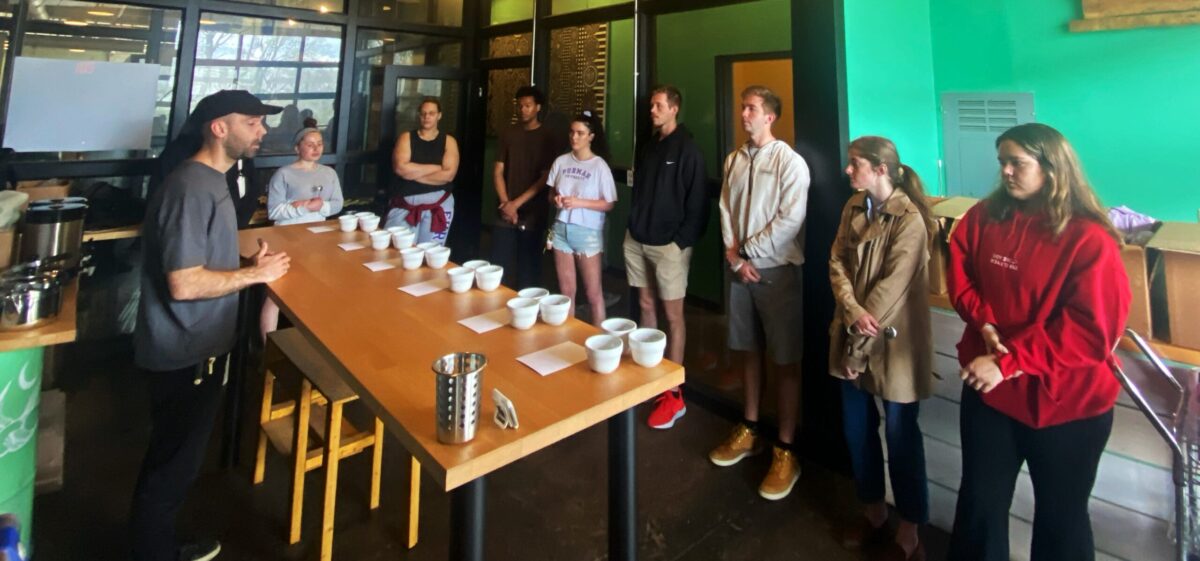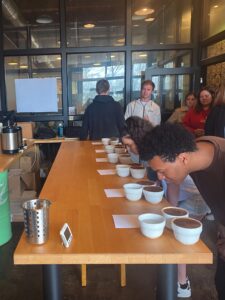Philosophizing About Coffee
- by Elise Dudley

Due South’s Ryan Hall speaks to students before the cupping
Furman University has long served Due South Coffee in their Library Café, keeping students fueled on responsibly sourced and locally roasted beans. So, when Bon Appétit Fellow and Furman Graduate Elise Dudley reached out to Professor Sarah Worth about bringing her Philosophy of Taste students to experience a coffee tasting at Due South’s Roastery, the educator welcomed the opportunity.
On a sunny day in March, a dozen students trickled into Due South’s cupping room in the back of their coffee shop and roastery, a few miles south of Furman’s campus. Welcomed by Ryan Hall, Director of Operations, students gathered around a long table with numerous bowls of ground beans neatly arranged. Due South Coffee Roasters has been a long-time Farm to Fork partner of Furman, since Bon Appétit began managing the dining services at the small liberal arts university in Greenville, South Carolina. It was Professor Worth herself who first made the introduction between Resident District Manager Koren Nappi, and Patrick McInerney, Co-Founder of Due South.
Before the afternoon cupping commenced, Ryan paused to ask, “so what is the philosophy of taste?”
Professor Worth turned the question to the class, and one student spoke up stating the philosophy of taste explores understanding what one likes, how one develops their preferences. Another elaborated on how taste requires experience and training to develop.
Ryan nodded along with their explanations before opening with a story. He recalled standing at the highest point in Nicaragua on a coffee farm, smelling the sweetness of blossoming trees in the air. In that moment, one of the coffee growers handed him a cup of coffee. As he sipped, he remembered vividly thinking, “this is the best coffee I have ever had…” Only a few moments later, he learned it was not from the farm. Humorously, he had been poured a mug of instant coffee.

A student takes a whiff of coffee grounds
For the following hour Ryan immersed the students in the world of specialty coffee. He began by establishing foundational language to describe coffee simplified into four basic categories: sweetness, acidity, bitterness, and body. When describing acidity, for example, he contrasted language like “sour” as a negative descriptor from “bright” as positive.
Coffee cupping involves observing the fragrance and tastes of coffee. While it’s performed professionally in the coffee industry, it can be done informally by anyone. This traditional way of tasting and evaluating coffee offers insights into a multitude of factors impacting coffee beans: from how coffee is cultivated and washed after being harvested on a farm to how minute adjustments between heat and time in roasting influence nuanced qualities.
Starting by evaluating the fragrance of dry grounds, he welcomed students to smell each of the eight coffees lined up on the table, arranged in order to increase complexity. Once every student had passed through, he opened the floor for observations. Hesitant to name specific flavors, students instead called out their favorite and least favorite cups.
Adding water to coffee releases flavor, and Ryan asked students to pay attention to changes after water was poured in. Everyone passed through to smell again. Following the “breaking the crust” of coffee ground that formed on the surface of each cup—and with special cupping spoons in hand—everyone passed through to taste the coffees. At every stage, students practiced naming smells and tastes including notes of olives, citrus, berries, flowers, and identified balance, brightness, sweetness, and bitterness. In conclusion, Ryan revealed the names, origins, and tasting notes for each of the eight single-origin coffees, and students passed through once more, comparing their perception with Due South’s tasting notes.
The experience provided an opportunity for the students to learn more about Bon Appétit’s coffee commitment to purchase in accordance with Fair Trade, Certified Organic, Rainforest Alliance, Bird Friendly, or Coffee and Farmer Equity (CAFE) certifications, alongside a continued support of local Farm to Fork coffee roasters. These local roasters, like Due South, supply more than half of the coffee Bon Appétit sources in its cafés across the country.
Beyond a fun and educational experience, the coffee cupping helped to highlight Due South’s longstanding partnership with the Bon Appétit at Furman University team for the students in attendance.